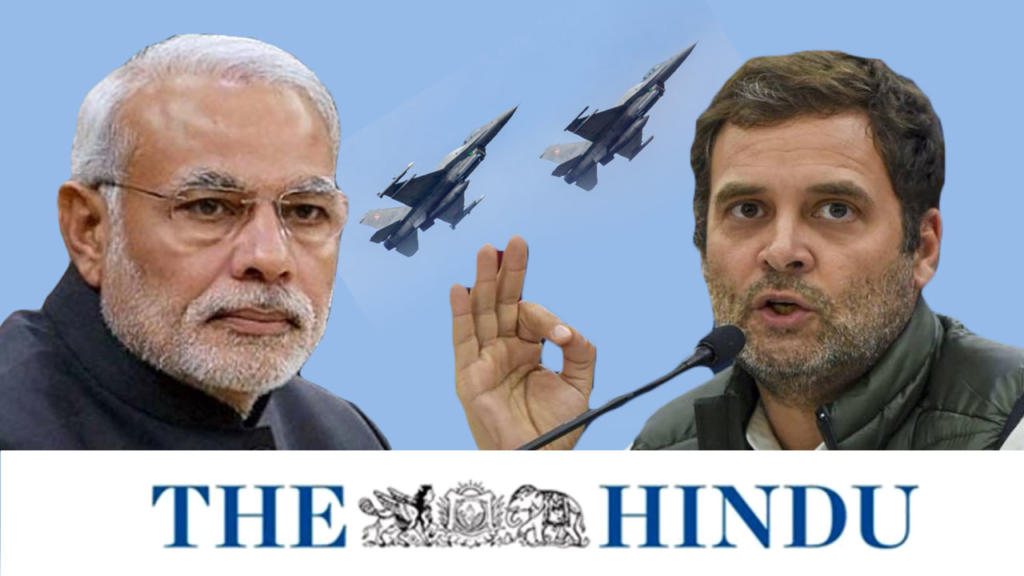Yesterday, veteran journalist N Ram’s article in the Hindu claimed that PMO was running a parallel negotiation on the Rafale deal while at the same time the Ministry of Defense (MoD) designated negotiation team was negotiating the terms of contract. The article claims, citing a MoD note, that Prime Minister Office’s (PMO) interference undermined India’s standing in terms of negotiations.
However, it seems N Ram had selectively quoted the MoD note. In the article, former the Hindu Editor-in-Chief claimed that the Defence Ministry protested that the position taken by the PMO was “contradictory to the stand taken by MoD and the negotiating team”. The then Defence Secretary, G. Mohan Kumar, made this official notation in his own hand: “RM may pl. see. It is desirable that such discussions be avoided by the PMO as it undermines our negotiating position seriously.”
However, according to the note accessed by the ANI, the then Defense Minister Manohar Parrikar had addressed the concerns of MoD on the issue of PMO’s interference. Parrikar wrote on the margins of the same note that PMO and French PM’s offices were simply monitoring the deal which was necessary since the deal was of utmost importance. Parrikar’s remarks on the note further claim that the para 5 (the para in MoD’s note which claimed that India’s negotiating stand was seriously being undermined by PMO’s interference ) was an ‘overreaction’ on the part of the MoD.
ANI accesses the then Defence Minister Manohar Parrikar’s reply to MoD dissent note on #Rafale negotiations."It appears PMO and French President office are monitoring the progress of the issue which was an outcome of the summit meeting. Para 5 appears to be an over reaction" pic.twitter.com/3dbGB9xF4Z
— ANI (@ANI) February 8, 2019
Notably, the MoD note that was used by The Hindu had carefully cropped Parrikar’s remarks on the note.
Pic 1: Complete letter with reply of then Raksha Mantri Manohar Parrikar
Pic 2: Cropped pic used by @the_hindu @nramind. Deliberately removed Parrikar's reply for their propaganda pic.twitter.com/zWhqEzUMfp
— Ankur Singh (Modi Ka Parivar) (@iAnkurSingh) February 8, 2019
The agenda, it seems, was to insinuate that PMO’s supposed interference in the Rafale deal was in relation to the pricing increase that N Ram’s previous article had mentioned. However, it was a blatant lie.
Earlier, in his previous article, N Ram had raised questions about the hike in the fixed cost caused due to the reduced number of aircraft. One may argue that if the fixed cost was to be borne, then why did the government not buy 126 jets to distribute that cost better? The answer can be seen from Raksha Mantri Nirmala Sitaraman’s statement in the Parliament. Any kind of emergency purchase consists of 2 squadrons (1 squadron has 18 aircrafts). Thus, given the precarious condition of the IAF which had only 32 squadrons left, an urgent filing up of the squadrons was necessary. The NDA had no choice but to go ahead with a purchase of 2 squadrons even if it meant paying a larger price. Perhaps PM Modi understands that national security takes precedence over squandering time and avoiding a 14% hike in price.
Secondly, the 1.4 billion Euro development costs were quoted in the UPA deal in 2009 as well. Time value of money works here too. Dassault could have increased the development costs in 2015. But rather than increase it, the NDA negotiated and had it reduced to 1.3 billion Euros. The government clearly tried the best it could.
Thirdly, a procedure was followed in accepting this high development cost and the Hindu mentions it. The Indian Negotiating Team (INT) voted by a 4-3 majority that the 1.3 billion Euro cost in 2015 was better than the 1.4 billion Euro cost of the 2009 Rafale deal. This point was made in front of the Defence Acquisition Council (DAC) as well as the Cabinet Committee on Security (CCS) who ratified it.
All in all, the Rafale deal is a step in the right direction, a much-needed lease of life for the Indian Air Force. It is sheer foolishness to insinuate that it is in any way similar to the Bofors deal. It seems that as the elections approach, the fake news factory is running to full capacity. It is disappointing to see an institution like the Hindu which started in order to aid India in her struggle for freedom against British rule, act as if its current motto were to achieve Freedom From Facts!
